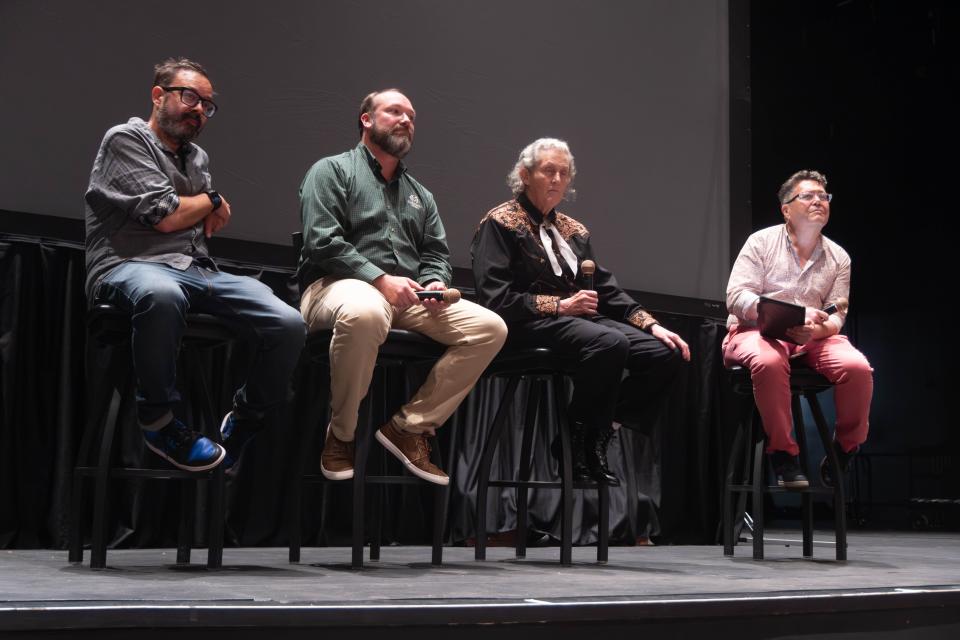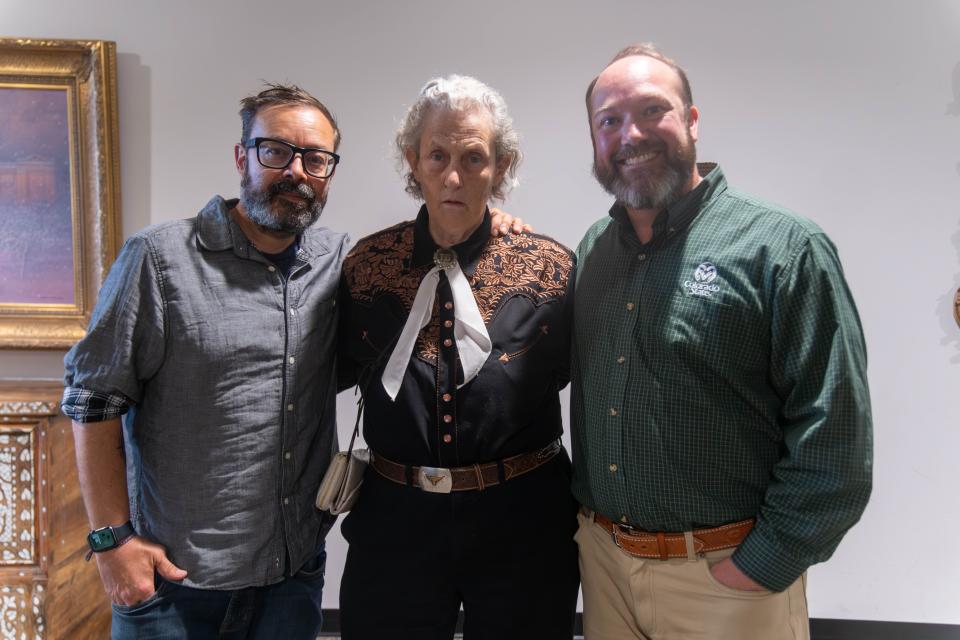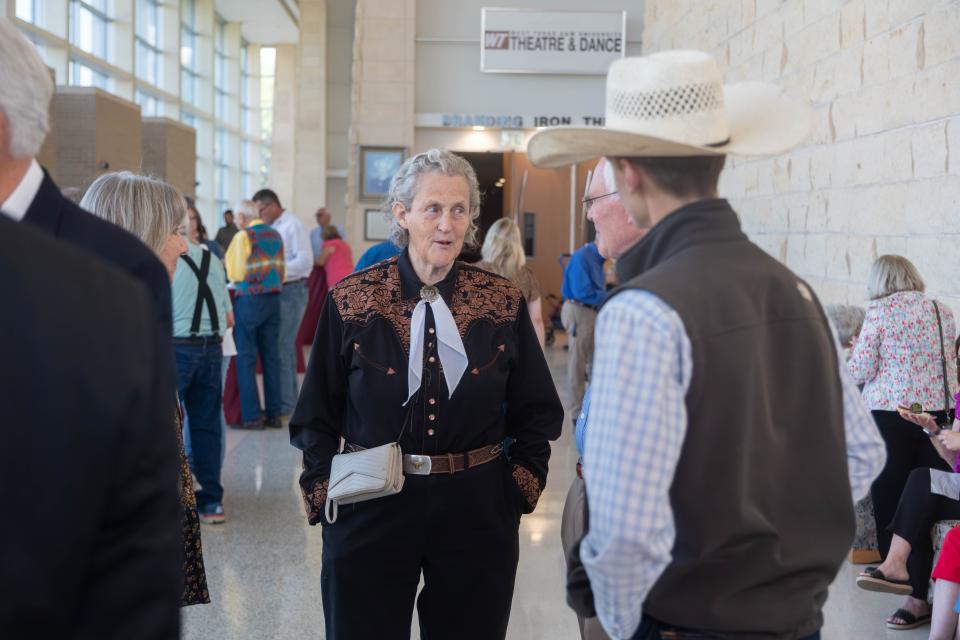WT hosts Temple Grandin, filmmakers for a new documentary on her life
- Oops!Something went wrong.Please try again later.
West Texas A&M University hosted a special screening Tuesday of a new film “An Open Door: Life and Influence of Temple Grandin,” a documentary about the award-winning academic and animal behaviorist as well as Autism spokesperson. The show featured the filmmakers and its subject talking about the film.
John Festervand, the development director for Colorado State’s College of Agricultural Sciences, was the executive producer of the documentary and spoke about how he got involved with the film and the motivation for the project.

“Temple is a wonderful supporter of the college, and what you see in the film is that she has funded her graduate students for the last 20 years. She is a wonderful supporter of her students,” Festervand said.
He said that he got to know Grandin about three years ago, and after watching the HBO film from 2010, based on her life, “Temple Grandin,” he felt that there was so much that she had done in her life that the movie does not cover what happened after that point in her life.
“The movie ends when she is 35, and she is going off to the University of Illinois to work on her Ph.D. Fast forward to last year, and she turned 75," Festervand said. "Think about how much time has happened between her going off to graduate school and this point in life. I thought this was a wonderful way to tell her story from a unique perspective, from people opening doors for her, to her opening doors for other people.”
He said the inspiration for the film was his spending time with her and honoring the importance of her legacy in a way that had not been done before.
“I really wanted Colorado State to do something cinematically that could honor her legacy, and I think we have accomplished that,” Festervand added. “One of the things that makes this such a cool story is not only the people that put it together, but the timeline that it took it to do this. We started shooting this film on her 75th birthday, Aug. 29."

Also, he said that with the story of the crew being CSU alumni working with the director makes the film even more special, with them working more than 1,500 hours to make this happen over nine months to be able to do a test screening during April to emphasize Autism Awareness Month.
Temple Grandin, the subject of the film, spoke about her motivation to keep teaching and what she wants to accomplish at this stage of her life.
“I want to see the kids that are different get out and be successful,” Grandin said. “I am really pleased that three of my former students became professors and that another oversees animal welfare at the North American Meat Institute. I want to have students that go out and do constructive things to improve the industry. I want to see these kids that think differently go out and do these metalworking jobs.”
Explaining what thinking differently means to her, Grandin said that she believes there are three distinct types of thinking. According to Grandin, there is verbal logical thinking, visual thinking and music and math thinking. She is a visual thinker, which means she thinks in pictures.
“I am very concerned that industries are screening out my types of thinkers,” Grandin said. “I have colleagues that cannot do algebra but are out building beef plants that started with a single welding class. One of the worst things that educators did was take out shop classes. They are beginning to bring them back, but often they will not let the special education kids take them because they are worried about safety."
She emphasized that special education students are very capable builders. "Twenty percent of the people I have worked with on equipment were either autistic, dyslexic or had ADHD," she said.

“Special education is the clever engineering department,” Grandin said. “The problem we have now is that the people I have worked with are getting old and retiring. Small shops are not being built to replace them. We are having a big problem with skill loss; how are we going to keep these power plants operating?”
She said that what worries her is that many businesses do not realize the importance of visual thinkers. She said that while many mathematical thinkers do an excellent job in design, visual thinkers give an essential dimension to designs that is often overlooked.
Grandin said that much of her success in the cattle industry had to do with her ability to think differently than others in seeing things from the visual perspective of the animals. She said that exposure to industries is essential to developing talent.
“How can someone know what they want to do if they have never been exposed to it?” Grandin said. “A lot of career paths start with exposure, then mentoring. I want to see the kids that are different go out there and be successful. I am seeing too many smart kids get stuck up on the label that their parents are not teaching them life skills. Kids are growing up today not doing hands-on things.”
She said the documentary emphasized teaching.
“I am way past retirement, but I am still going to teach. Teaching does not get enough credit,” Grandin said. “I have to credit all the teachers that helped me, from my speech teacher who got me talking by age 4, my mother encouraging my art ability, my high school science teacher who mentored me for about five years and a former Marine Corps captain, (to) a contractor that started a small steel and concrete business who came to me to design projects. These people were important mentors."
John Barnhardt, an Emmy award-winning cinematographer for the series “Born to Explore,” a travel and adventure show which aired for 83 episodes from 2011 to 2014, spoke about his film and subject.
He said that his work with the organization Surfer’s Healing, which works to take autistic children surfing, put him on the radar to do this project. Surfer’s Healing was founded by Izzy and Danielle Paskowitz, spurred by their son Isaiah’s diagnosis with autism.
“When I met Festervand, we just connected,” Barnhardt said. “My hands-on experience of getting students' hands on the gear and being on set and learning aligned with Temple’s process for helping her students in the cattle industry learn. Because we are both visual thinkers, we aligned perfectly for the project.”
Barnhardt said that he had been a student of film since he was 9 years old when his father, a photographer, took him to see “The Road Warrior,” which spurred his ambition to make movies.
“I was a visual thinker, and I think he caught on to that,” Barnhardt added.
He said that his approach to film is to shoot for the edit, working from the edit first and working backward.
“We got eight work-study students that were fantastic for this film,” Barnhardt said. “We had a plan with a stringent deadline and had to execute it.”
When asked what made Grandin a compelling subject for his film, Barnhardt said she is one of today's most influential people.
“She is a pioneer like Jane Goodall and Rosa Parks,” Barnhardt said. “She was up against a lot, and she defied that. Rosa Parks sat in the front of the bus when they told her to get to the back, and they told Jane Goodall that she might not be able to be that kind of scientist and she did. Same with Temple. They were not letting her into the feed yards. Temple says that being a female was much harder than having autism. She grew up in a time when autism was not very understood, and she persevered through that.”
Barnhardt says that Grandin’s ability to overcome the barriers in the cattle industry, which was dominated by white men while also having autism, indicates her amazing perseverance.
“What I want people to get out of this movie is perseverance and having a purpose,” Barnhardt said. “Temple’s purpose is huge; she is working on her 16th book right now and has written over 500 articles. She is just coming into her own at her age. I think part of the inspiration of this movie is that your career is not dead when you turn 50 or 65; you might just be coming into a season of your life.”
He says he hopes the film inspires people to be better human beings to each other, because you never know who that person might turn out to be.
The film is currently being shopped to film festivals and distribution companies for theatrical or streaming release.
This article originally appeared on Amarillo Globe-News: WT hosts special screening of Temple Grandin documentary

